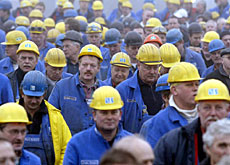Working week shifts direction

The trend towards a shorter working week in Europe appears to be going into reverse, after Germany’s IG Metall union agreed to increase working hours.
Workers in Switzerland put in far more hours than their German and French counterparts, but employers say a longer working week may be needed to stay competitive.
Swiss workers put in an average of 41.7 hours a week compared with 35 hours in some sectors in neighbouring Germany and France.
Their German counterparts in the automotive, metal and electronic industries, for instance, have enjoyed a shorter working week for ten years.
But that has just changed for employees at German technology giant, Siemens, who are now returning to a 40-hour week with no pay increase in order to save their jobs.
The powerful IG Metall union agreed to the increase after the company said it would close two mobile phone factories in Germany and relocate production to Hungary – where wages are one fifth of what they are in Germany – unless the 40-hour week was reintroduced.
Savings
The move will save Siemens 30 per cent on staff costs. In return, the company says it will maintain the factories for at least two years and invest €30 million in innovation processes.
The director of the Swiss Employers’ Association, Peter Hasler, warns against reading too much into the Siemens case.
“You can’t draw a general conclusion… This is a company-specific problem with a company-specific solution,” he said.
But scores of other German companies, along with some political leaders, have indicated that they support a longer working week without an increase in pay.
For Paul Rechsteiner, president of the Swiss Federation of Trade Unions, the suggestion makes no sense.
Unemployment
“We are currently facing high unemployment – there are lots of qualified people without work. In this situation, it makes no sense to make the working week longer.”
But in Switzerland – one of the countries with the longest working week – the debate appears to be moving in the same direction.
Johann Schneider-Amman, president of Swissmem, the umbrella organisation of Swiss mechanical and electrical engineering industries, recently asked if “it would be possible to negotiate controlled increases in the number of working hours”.
His aim is to restore the 42-hour working week so as to improve international competitiveness. The sector is Switzerland’s biggest exporter.
Such calls are far more muted than in Germany, but similar sentiments have been expressed by the Federal Railways, the post office (Swiss Post) and the banks.
“We did not make the same mistakes that France and Germany made,” said Peter Hasler, referring to the introduction of the 35-hour week in those countries.
“Here, the problem is not so urgent. It only makes sense to increase the number of hours to remain competitive if you have already gone too far in the other direction. Take the Federal Railways, for instance, which introduced the 39-hour week.”
Greater flexibility
Hasler says the issue in Switzerland is one of “flexibility”: workers must be prepared to temporarily increase or reduce working hours, depending on the state of the industry and the economy.
This view is anathema to union boss Paul Rechsteiner. “From an economic standpoint it’s absurd: Swiss productivity is still very high, thanks to its highly skilled and motivated workforce. Weakening employment conditions will not make people more productive.”
Where Rechsteiner and Hasler do agree is that longer working hours are not the first step towards a weakening of working conditions.
“Nobody wants to return to the Middle Ages, when people worked 60 hours a week,” said Hasler. “There will always be countries where people work longer. But we want working hours to be managed in a more flexible manner.”
Rechsteiner believes productivity will be the main determinant of working conditions.
“Maintaining adequate standards of living depends on the balance of power between workers and employers,” he said.
“But it should be understood that, at the international level, productivity is high where working conditions are good, and not vice versa”.
swissinfo, Marzio Pescia
The working week in Switzerland averages 41.7 hours (1,891 hours a year).
That’s roughly 200 hours a year more than in Germany, according to the OECD.
Unemployment in Switzerland stands at 3.8%, compared with nearly 10% in Germany.
In March 2002, three-quarters of Swiss voted against reducing the working week to 36 hours.
The 35-hour week was introduced ten years ago in Germany, primarily in the automotive, metal-processing and electronics industries.
Over the past 30 years, the per capita working hours of German workers have fallen by 25%.

In compliance with the JTI standards
More: SWI swissinfo.ch certified by the Journalism Trust Initiative

You can find an overview of ongoing debates with our journalists here. Please join us!
If you want to start a conversation about a topic raised in this article or want to report factual errors, email us at english@swissinfo.ch.